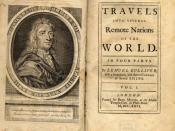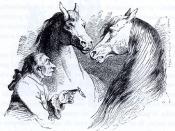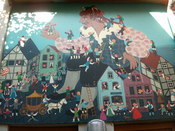It is now widely assumed that "Gulliver's Travels", like much of Swift's writing, is carefully designed to engage readers in a strenuous process of meaning-making--that "the book becomes a machine designed not to advance a set of doctrines but to start readers on the way to reflection, self-doubt, and fresh thought" (Ehrenpreis, 2001). Because Gulliver is a naive narrator of limited curiosity, readers repeatedly notice his obtuseness (as when he defends at length the reputation of the Lilliputian Lady who was accused of having had an affair with him. Readers are also invited to discover what Gulliver overlooks (like key resemblances between Lilliput and England), to fill in gaps in his reasoning (as when he explains why the Lilliputians conclude "that Parents are the last of all others to be trusted with the Education of their own Children" (Swift, 2000), and to consider issues he only gestures towards (In what ways--if any--are the laws and institutions of Lilliput superior to those of England?) and questions he doesn't even ask (How did the King of Brobdingnag or Don Pedro become so much better than most other people?).
(Hinnant, 1999)The challenge of Gulliver's Travels is different, however, from that of Utopia. More's book engages readers directly in the process of comparing the procedures and institutions of their own country with those of his imaginary island. It presents a remarkably successful Utopia as the clear answer to English evils, describes its laws and policies in sufficient detail to answer the doubts expressed by the character Thomas More, in his first conversation with Raphael, that a society based on common ownership would never work, and it leaves readers to consider what (if anything) Raphael has failed to report, to assess what has been sacrificed to make Utopia work, to speculate about the...


